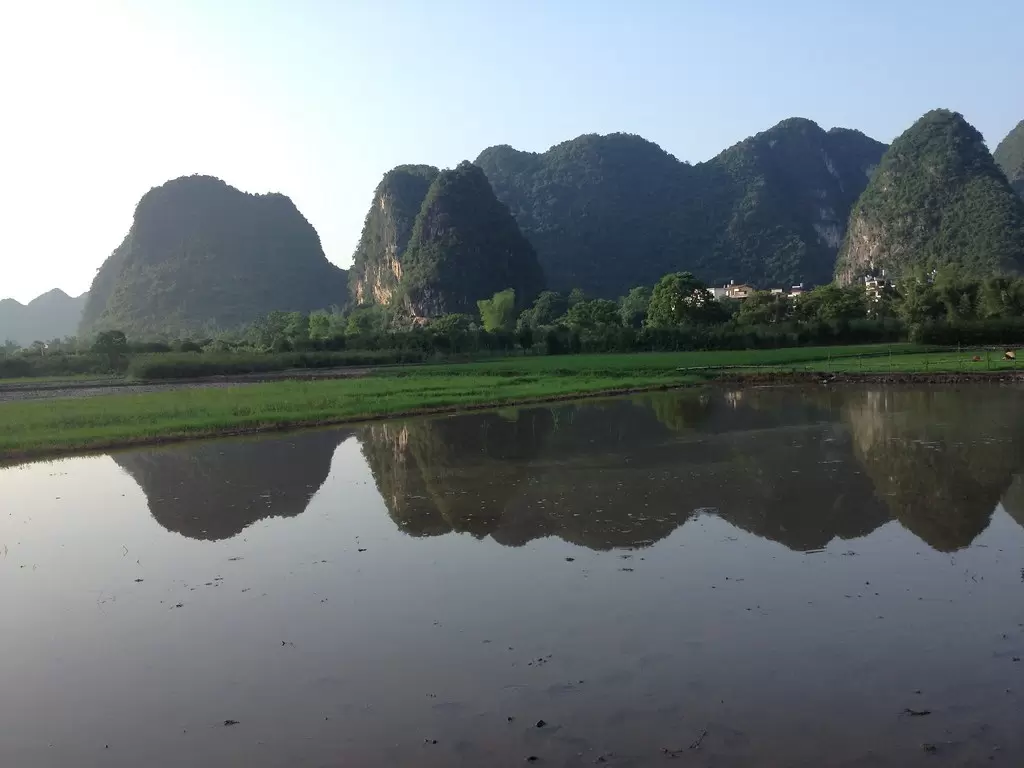Yangshuo is a city located in the south of China and is famous for its natural beauty. However, this city also has historical bridges. These bridges are reflections of the past and preserve the historical texture of the city.
The bridges in Yangshuo are usually made of stone and wood. These bridges are usually located over rivers or next to water channels. The construction date of the bridges usually dates back to the Ming and Qing dynasties.
The bridges in Yangshuo are used not only for transportation but also for tourism purposes. These bridges offer visitors the opportunity to take a historical journey. In addition, the natural beauty around the bridges also attracts visitors.
The historical bridges of Yangshuo preserve the historical texture of the city and reflect the reflections of the past. While these bridges offer visitors the opportunity to take a historical journey, they also enchant with their natural beauty.
Traces of the Past in Yangshuo: Historical Bridges

Yangshuo is a district of Guilin, located in the south of China. This region is famous for its natural beauty and historical structures. The historical bridges in Yangshuo are also among these structures.
The historical bridges in Yangshuo are among the structures dating back to the Ming and Qing Dynasties. These bridges were built to provide transportation in the region during that time. These bridges, combined with the natural beauty of Yangshuo, attract the attention of tourists.
The most famous historical bridges in Yangshuo are Yulong Bridge, Fuli Bridge, and Xiangui Bridge. These bridges are the best-preserved historical structures in the region. Yulong Bridge is one of the oldest bridges in the region and dates back to the Ming Dynasty. Fuli Bridge, on the other hand, is one of the longest bridges in the region and dates back to the Qing Dynasty. Xiangui Bridge is one of the most beautiful bridges in the region and dates back to the Ming Dynasty.
The historical bridges in Yangshuo reflect the region's historical and cultural heritage. These bridges also contribute to the tourism industry in the region. Tourists can discover the region's historical and cultural heritage by visiting these bridges. Additionally, the natural beauty of these bridges combined with the scenery also attracts tourists.
In conclusion, the historical bridges in Yangshuo reflect the region's historical and cultural heritage. These bridges also contribute to the tourism industry in the region. Tourists can discover the region's historical and cultural heritage by visiting these bridges. Additionally, the natural beauty of these bridges combined with the scenery also attracts tourists.
Historical Bridges in Yangshuo: Legacy of the Past

Yangshuo is a city located in the south of China. This city is famous for its natural beauty, historical structures, and cultural heritage. The historical bridges in Yangshuo are also an important part of this cultural heritage.
The historical bridges in Yangshuo are generally made of stone and wood. These bridges are usually found over rivers or in valleys. These bridges are an example of China's traditional architecture and reflect the richness of Chinese culture.
The most famous historical bridges in Yangshuo include Yulong Bridge, Fuli Bridge, and Xiangui Bridge. These bridges are an important part of China's historical and cultural heritage and are frequently visited by tourists.
Yulong Bridge is one of the oldest bridges in Yangshuo. This bridge was built during the Ming Dynasty and has a history of approximately 600 years. Yulong Bridge is located over the river and is made of stone. This bridge is one of the most beautiful examples of China's traditional architecture.
Fuli Bridge is another historical bridge in Yangshuo. This bridge was built during the Qing Dynasty and has a history of approximately 200 years. Fuli Bridge is made of wood and is located over the river. This bridge is another beautiful example of China's traditional architecture.
Xiangui Bridge is another historical bridge in Yangshuo. This bridge was built during the Tang Dynasty and has a history of approximately 1300 years. Xiangui Bridge is made of stone and is located over the river. This bridge is one of the most important examples of China's traditional architecture.
In conclusion, the historical bridges in Yangshuo are an important part of China's historical and cultural heritage. These bridges are beautiful examples of China's traditional architecture and are frequently visited by tourists. These bridges should be preserved as a legacy of the past and passed down to future generations.
The Story of Bridges in Yangshuo: Historical Reflections

Yangshuo is a district of Guilin, located in the south of China. This region is famous for its natural beauty, historical structures, and cultural richness. The bridges in Yangshuo are also a part of this wealth.
The bridges in Yangshuo are notable for their historical reflections. These bridges are among the structures dating back to the Ming Dynasty. The Ming Dynasty period is one of the most important periods in Chinese history. During this period, Chinese culture and art underwent significant development. The bridges in Yangshuo also bear the traces of this period.
The most important bridges in Yangshuo include Yulong Bridge, Fuli Bridge, and Xiangui Bridge. These bridges are some of the finest examples of Chinese architecture. The materials used in the construction of the bridges were limited by the technological possibilities of the time, so the durability and aesthetics of the structures were of great importance.
The bridges in Yangshuo are not only historical structures but also important cultural heritages. These bridges are a part of Chinese culture and hold great importance for the Chinese people. Therefore, the preservation and restoration of the bridges are of great importance.
In conclusion, the bridges in Yangshuo are among China's important structures with their historical and cultural richness. These bridges are a part of Chinese culture and are important heritages that need to be preserved. The historical reflections of the bridges in Yangshuo reflect important periods in Chinese history, and therefore, the preservation and restoration of these bridges are of great importance.
Historical Bridges in Yangshuo: Memories of the Past

Yangshuo is a town located in the south of China. This town is famous for its natural beauty, historical structures, and cultural heritage. The historical bridges in Yangshuo are also an important part of this cultural heritage.
The historical bridges in Yangshuo are generally made of stone or wood. These bridges have played an important role in the town's history. In particular, the bridges built during the Tang Dynasty were made to meet transportation needs at that time. Despite being built with the technological capabilities of that time, these bridges have remained standing to this day.
The historical bridges in Yangshuo not only meet transportation needs but also reflect the town's cultural heritage. These bridges also contain important events and memories from the town's history. For example, the Yulong Bridge is one of the town's oldest bridges and was built during the Tang Dynasty. This bridge has witnessed important events in the town's history.
The historical bridges in Yangshuo also attract tourists. These bridges, combined with the town's natural beauty, are one of the places tourists enjoy visiting. Additionally, these bridges are important for preserving the town's cultural heritage. Therefore, the historical bridges in Yangshuo have been protected and restoration work has been carried out.
In conclusion, the historical bridges in Yangshuo have an important place in the town's history. These bridges not only reflect the town's cultural heritage but also attract tourists. Therefore, it is important to preserve these bridges and carry out restoration work to protect the town's cultural heritage.
Historical Bridges in Yangshuo: The Grandeur of the Past

Yangshuo is a city located in the south of China. This city is famous for its natural beauty, historical structures, and cultural richness. The historical bridges in Yangshuo are one of these riches.
The historical bridges in Yangshuo are some of the most beautiful examples of traditional Chinese architecture. These bridges are usually built using stone and wood materials. Most of the bridges in Yangshuo were built during the Ming and Qing dynasties. During these periods, the bridges were used not only for transportation but also for trade and cultural interaction.
The most famous historical bridges in Yangshuo include the Yulong Bridge, Fuli Bridge, and Xiangui Bridge. The Yulong Bridge is located on the Yulong River and was built during the Ming Dynasty. The Fuli Bridge is located in Fuli Town and was built during the Qing Dynasty. The Xiangui Bridge is located in the center of Yangshuo and was built during the Ming Dynasty.
The historical bridges in Yangshuo are not only important from an architectural perspective but also from a cultural perspective. These bridges reflect China's traditional culture. In addition, festivals and events held in the areas where the bridges are located help to preserve China's traditional culture.
In conclusion, the historical bridges in Yangshuo are some of the most beautiful examples of traditional Chinese architecture. These bridges are important from a historical and cultural perspective and reflect China's traditional culture. Visitors to Yangshuo can get a close look at China's rich culture by seeing these bridges.

Comments